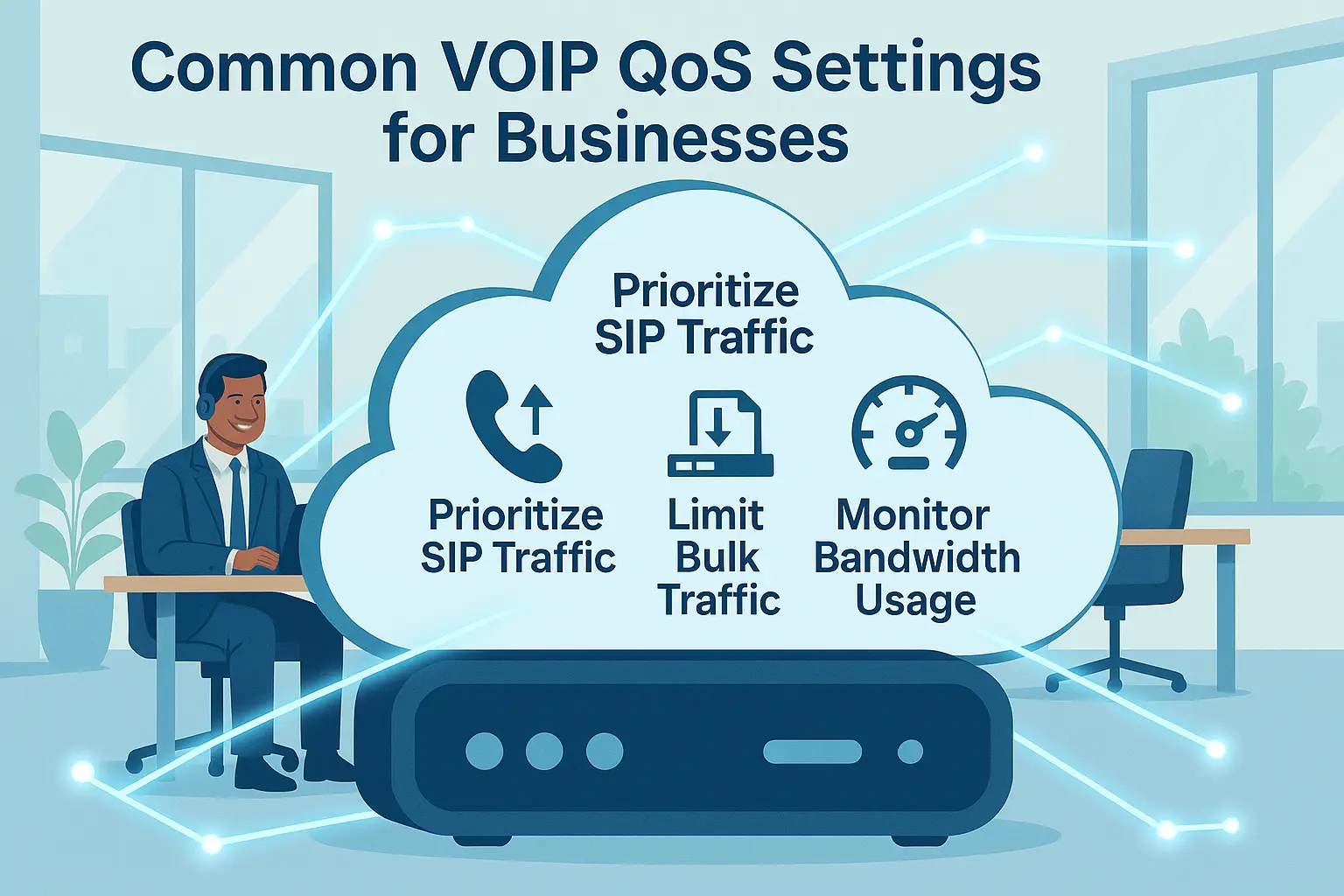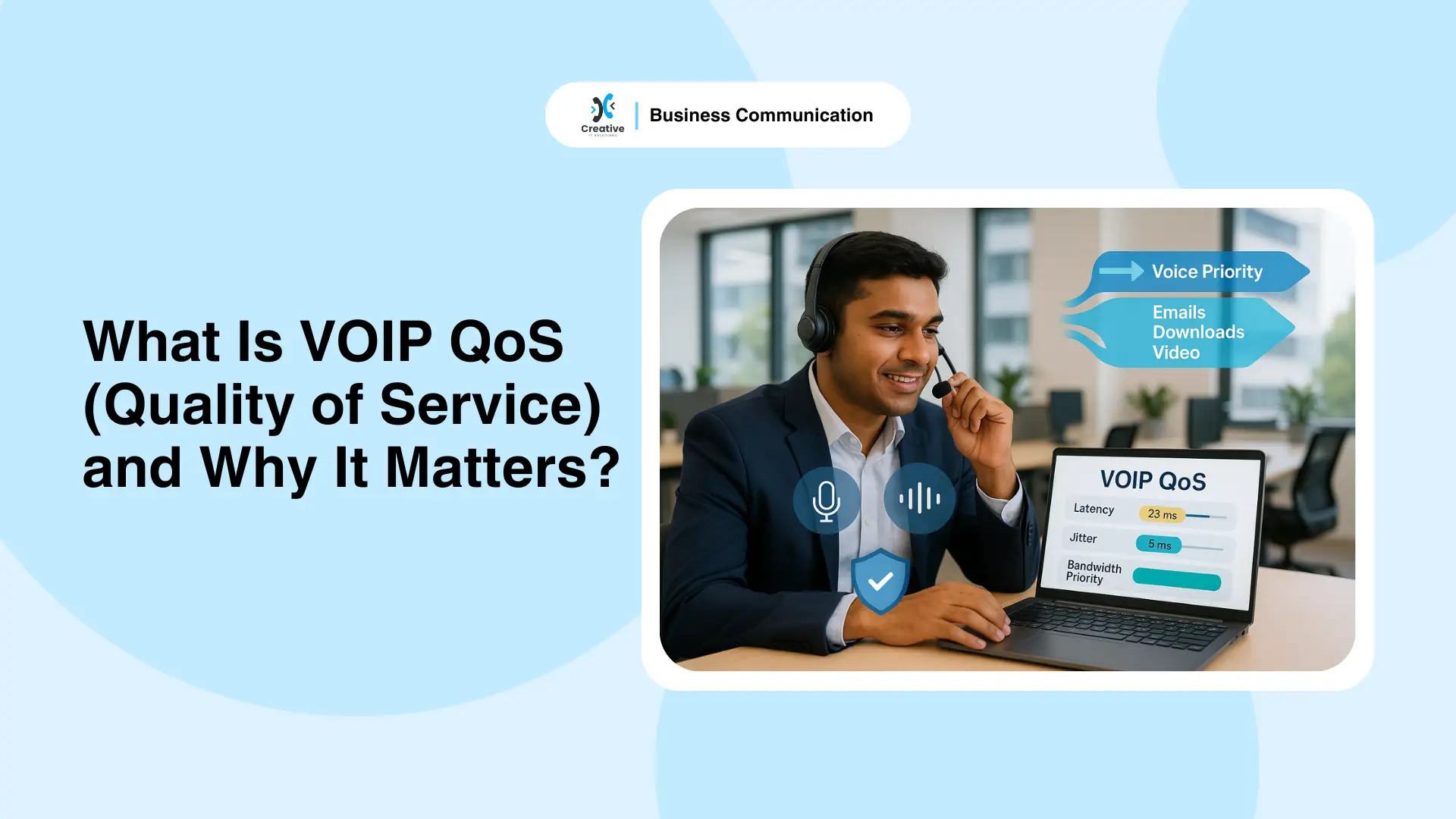Many businesses ask: what is VOIP QoS and why does it matter? The reason is simple – call quality can make or break customer trust. Without proper Quality of Service (QoS), VOIP calls often suffer from delays, echoes, dropped lines, or distorted audio. For startups and SMEs that rely on every customer interaction, these problems can mean missed sales and unhappy clients.
VOIP QoS (Quality of Service) is the technology that ensures your voice traffic gets top priority on the network. By managing bandwidth and preventing congestion, QoS delivers smooth conversations even when your internet is busy with emails, video meetings, or file transfers. In other words, QoS is what separates poor internet calls from professional VOIP call quality.
In this guide, we’ll break down what VOIP QoS really means, why it’s critical for growing businesses, and how it supports reliable communication as part of modern business VOIP solutions.
Table of Content
ToggleWhat Is VOIP QoS (Quality of Service)?
What is VOIP QoS? VOIP QoS, or VOIP Quality of Service, refers to the network settings that control how internet traffic is managed so that voice calls always remain clear and reliable. Since VOIP calls travel through the same internet connection as emails, file downloads, or video streams, they often compete for bandwidth. Without QoS, this competition leads to lag, call drops, jitter, and poor clarity.
In simple terms, VOIP QoS makes sure your business calls get “first priority” on the network. Routers and switches identify voice packets and send them ahead of lower-priority traffic like file transfers or background updates. This keeps VOIP call quality consistent, even during heavy internet use.
For example, without QoS, a colleague downloading a large file could instantly disrupt your customer call. With QoS, the system reserves bandwidth for your voice traffic so conversations remain smooth. This is why startups, SMEs, and call centers in India rely on VOIP QoS as the foundation of professional business VOIP solutions.
Why VOIP Quality of Service Matters for Businesses
When people search for what is VOIP Quality of Service, they’re not just asking for a definition – they want to know why it matters for real-world business communication. The truth is simple: without QoS, even the best VOIP system can fail. Here’s why it’s so important for companies of all sizes.
Improves VOIP Call Quality
The most obvious benefit of QoS is improved VOIP call quality. By prioritizing voice packets, your router ensures that conversations stay clear, uninterrupted, and professional. For sales teams pitching clients, customer support centers handling queries, or managers running remote meetings, high-quality calls can be the difference between closing a deal and losing one.
Reduces Latency and Jitter
Latency (the delay between speaking and hearing a response) and jitter (distorted or broken voice) are common problems in VOIP systems. QoS helps minimize both by reserving enough bandwidth for calls and preventing interference from other online activities. This keeps conversations natural and avoids the awkward pauses or miscommunication that frustrates customers.
Increases Reliability
Without QoS, something as simple as a colleague streaming a video or downloading a large file can instantly ruin your call experience. With QoS in place, your network allocates priority to voice data, making your calls reliable regardless of other activity on the connection. For businesses that handle hundreds of calls daily, this reliability builds client confidence and reduces downtime.
Better Customer Experience
At the end of the day, good VOIP call quality translates directly into a better customer experience. Clear, uninterrupted conversations mean fewer complaints, faster resolutions, and a more professional brand image. Customers trust companies that sound dependable, and QoS ensures that every call reflects that professionalism.
In short, VOIP Quality of Service matters because it keeps your communication smooth, reliable, and professional. For businesses in India that rely on daily customer calls, QoS is not just a technical setting – it’s a foundation for better relationships and stronger growth.
How Does VOIP QoS Work?
To understand what is VOIP QoS (Quality of Service), you need to see how it works behind the scenes. In simple terms, VOIP QoS identifies voice data packets on your network and treats them as a top priority. Instead of competing with emails, video streams, or file downloads, your calls are given the fastest and most reliable route.
Here are the main ways QoS ensures smooth VOIP call quality:
Traffic Shaping
Traffic shaping controls how data flows across your network. Without it, heavy internet activities like video streaming or large file transfers can consume all available bandwidth, leaving little room for calls. With traffic shaping, your router organizes and limits other traffic so that voice calls always move first.
Bandwidth Reservation
QoS allows you to reserve a specific portion of your internet bandwidth only for voice traffic. For example, if your office has a 100 Mbps connection, you could dedicate 20 Mbps for VOIP calls. Even during peak usage, this reserved space guarantees your calls stay clear and uninterrupted.
Packet Prioritization
Every piece of information sent over the internet is broken into “packets.” With QoS, routers mark voice packets as “high priority.” This ensures they reach their destination faster than lower-priority data like background software updates or email syncing. The result is a smoother and more natural conversation.
Why This Matters for Businesses
By combining traffic shaping, bandwidth reservation, and packet prioritization, businesses ensure stable VOIP call quality. Employees can make customer calls without interruptions, and clients experience professional, reliable communication. In short, VOIP QoS works by making sure your voice always comes first on the network.

Common VOIP QoS Settings for Businesses
When learning what is VOIP QoS, it’s not enough to know the definition – you also need to understand the actual settings that keep calls stable. Most modern routers and cloud telephony platforms allow businesses to configure these QoS rules without needing advanced IT knowledge. Setting them correctly ensures that your VOIP call quality remains reliable.
Here are the most important VOIP QoS settings every business should know:
Prioritize SIP Traffic
VOIP calls run on SIP (Session Initiation Protocol). By telling your router to prioritize SIP traffic, you make sure that call setup and audio streams are always stable. Without this setting, calls can lag or drop whenever the network gets busy.
Related Articles: What Is SIP Trunking in VOIP and How Does It Work?
Limit Bulk Traffic
Large file downloads, video streaming, or system updates can hog bandwidth and disrupt calls. A good QoS setup limits bulk traffic so that these activities don’t interfere with customer conversations. For example, your router might slow down a 1GB file download while ensuring calls run smoothly.
Monitor Bandwidth Usage
As your business grows, so does internet usage. Monitoring bandwidth helps you adjust QoS rules when needed. If your call center expands from 5 to 50 agents, you’ll need to reserve more bandwidth for voice traffic to maintain the same level of VOIP call quality.
Why These Settings Matter
For companies investing in business VOIP solutions, configuring these QoS settings is the difference between frustrated customers and seamless communication. Even small tweaks – like prioritizing SIP or reserving a portion of bandwidth – can dramatically improve call reliability.
Pro Tip: Always test your QoS settings after changes. Make sample calls, measure latency, and confirm that file downloads or video meetings no longer affect call clarity.
Benefits of VOIP QoS for Startups and SMEs in India
When you understand what is VOIP QoS, it becomes clear why it’s essential for growing businesses. Startups and SMEs in India often run on lean teams and budgets, which makes reliable communication even more critical. With proper QoS settings in place, even a small company can deliver enterprise-level professionalism.
Professional Call Quality
QoS ensures your VOIP call quality stays clear and uninterrupted, no matter how busy your internet connection is. This means even a 5-person startup can sound as professional as a large enterprise during client calls.
Scalable Communication
As your business grows, QoS scales with you. Whether you add 10 or 100 new employees, QoS adapts by reserving more bandwidth for voice traffic. This makes expansion smoother and keeps communication reliable without expensive hardware upgrades.
Improved Productivity
Poor call quality leads to wasted time repeating information or troubleshooting dropped calls. With QoS, teams spend less time fixing technical issues and more time serving customers, closing sales, or collaborating effectively.
Customer Trust
Clear calls leave a lasting impression. When clients hear your team without lag, echoes, or distortions, they naturally trust your business more. This trust is crucial for startups trying to build credibility in competitive markets.
Final Thoughts on What Is VOIP QoS and Why It Matters
If you’ve ever asked yourself what is VOIP QoS (Quality of Service), the answer is straightforward: it’s the backbone of clear and reliable internet calling. Without QoS, your business is at risk of call drops, frustrating delays, and poor conversations that hurt your brand. With QoS, you get a communication system that gives voice traffic priority, keeps calls smooth, and supports long-term growth.
For Indian startups and SMEs, implementing QoS means more than just better VOIP call quality – it means improved productivity, happier customers, and a stronger professional image. It ensures your team sounds dependable, whether they’re handling a small client meeting or running a large call center.
Ready to improve your VOIP call quality?
Explore our Cloud Telephony services at Creative IT Solutions and see how trusted experts in business VOIP solutions can give you secure, reliable, and scalable communication.
Frequently Asked Questions
Q1. What is QoS for VOIP?
VOIP QoS (Quality of Service) is a network feature that prioritizes voice data packets over other internet traffic. It ensures stable VOIP call quality by reducing lag, jitter, and call drops.
Q2. What is a QoS requirement for VOIP calls?
The key QoS requirements for VOIP calls include low latency (under 150ms), minimal jitter (under 30ms), and enough reserved bandwidth to keep audio clear even during heavy internet use.
Q3. Is it better to have QoS on or off for VOIP?
For VOIP systems, it’s always better to keep QoS on. With QoS enabled, your router prioritizes calls over downloads and streaming, giving you smooth and reliable communication.
Q4. How does QoS improve VOIP call quality?
QoS improves VOIP call quality by reserving bandwidth for voice traffic, reducing delays, and ensuring packets arrive in the correct order. This creates natural, professional-sounding conversations.
Q5. Can small businesses benefit from VOIP QoS?
Yes. Even small startups can benefit from VOIP QoS because it allows them to deliver professional-level communication without expensive infrastructure. Clear calls build customer trust.
Q6. Who configures QoS for VOIP calls?
QoS settings are usually configured on your router or cloud telephony platform. Many businesses rely on licensed VOIP providers in India to set up and maintain QoS correctly.

